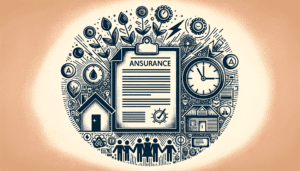How Inflation Can Affect Car Insurance Rate – InsuranceNewsNet – Insurance News Net

The effects of inflation facing companies and consumers alike may also cause your car insurance rates to rise when it is time to renew your policy. Like many other financial obligations, car insurance is an expense that’s facing pressure due to disruptions caused by the pandemic and its economic effects.
According to industry and media reports, insurers may hike premiums from 6 percent to upward of 10 percent this year. Understanding what is fueling price increases may help you find ways to save. Here are the reasons rates are increasing and the steps you can take to keep costs as low as possible.
Why are auto insurance rates increasing?
The effects of the COVID-19 pandemic on the economic systems underpinning common industries like auto insurance are resulting in noticeable inflation in the economy overall and within many economic sectors. Inflation in auto insurance rates is due at least in part to the seven following factors:
–General inflationary pressures: With inflation hitting 7.5 percent on consumer goods, general cost increases are affecting multiple components of car insurance, from repairs to replacement costs.
–Chip shortages: A perfect storm of industry pressures and COVID-19 disruptions have caused a global shortage of the semiconductor chips needed for new vehicles.
–Low vehicle inventory: Several factors have contributed to the vehicle inventory crunch, including chip shortages. Low vehicle inventory inflates the cost of new cars, which in turn can affect insurance premiums. Low inventory also translates to fewer and more expensive rental cars, increasing insurance companies’ costs as they pay for customers’ rentals.
–Replacement costs: For policies that stipulate comparable replacement costs, insurance companies are forking over more to buy comparable cars in this market when a car is totaled.
–Worker shortages: The auto industry is experiencing a technician shortage right as many industries are offering higher pay to recruit and maintain staffing, potentially upping prices.
–Repair costs: Due to factors like inflation on part prices, supply chain issues and worker shortages, repair costs have increased.
–COVID-19 cleaning costs: Auto repair shops may be required to engage in COVID-19 cleaning processes. They bill insurance companies for the time and cost of this process, raising the cost of a typical repair job.
How to reduce car insurance rates.
While you cannot control how insurers price their policies, you can take action to avoid shouldering higher costs. Here are ways you can directly reduce your car insurance rates or mitigate increases.
–Compare insurance quotes. Price comparison sites can help you ensure you are not overpaying for insurance. Experian, for example, leverages technology from Gabi, an auto insurance marketplace and part of Experian, to compare quotes from more than 40 top providers in minutes.
–Reduce coverage. When the cost of auto insurance gets tight, you could consider reducing coverage. Review your policy and see if you have any add-ons that you could do without, such as roadside assistance. If you have an older car that may not be worth the cost of repairs, you might weigh removing collision and comprehensive coverage costs with how much you’re willing to spend on any potential repairs.
–Increase your deductible. One way to get a lower premium now is to opt for an increased auto insurance deductible later. Your deductible is the amount you pay after an incident before your insurance kicks in. Increasing your deductible will reduce your premium now — but you’ll pay more out of pocket if you have an incident down the road.
–Use driver tracking programs. Your insurance premiums are determined by the information the insurer collects to calculate the level of risk of insuring you. If you provide them with more information about your specific driving habits by using an app or a recording device in your vehicle, it could reduce your costs. With more information about how you drive, the insurance company may drop your rates by 25 percent or more.
–Check for discounts. Have your circumstances recently qualified you for a new discount such as a senior/retirement discount or a good student discount? Check out your insurer’s various discounts and see where you can save.
–Improve your credit score. Your credit history may affect the price of your auto insurance if your insurance company considers your credit-based insurance score. These scores are based on your credit reports but look at the likelihood that you will file a claim and can raise or lower your rates accordingly. You can check your credit report and score for free to find out where you stand and how that might affect your insurance-based credit score.
–Pay off your auto loan. If your vehicle is still financed, your lien holder may require that you hold a higher level of insurance, such as comprehensive and collision. If you are close to the end of your loan, pay it off and consider reducing or dropping your insurance coverage to something more manageable.
Other ways to save money as prices rise.
As inflation rises across industries, there are some cost increases you may just have to swallow. But there are places you may be able to reduce expenses to balance out insurance and other price increases:
–Groceries: Where you shop and what you buy can have a big effect on your grocery bill. Consider swapping to single-brand grocery stores and purchasing more plant-based meals to cut the bill.
–Car loan: Cut costs on other car necessities by refinancing your loan if you can find a better interest rate. Refinancing can be done through your original lender or through a new lender.
–Entertainment: Even if you already cut the cord, it may be time to take it one step further and cut back on streaming services temporarily. Consider instead free entertainment apps such as library-card enabled Hoopla or free live TV from Xumo, Pluto TV or Tubi.
–Electric bill: Be mindful of electricity usage, especially in spaces where you’re not using lights. You may be able to opt in to a time-of-use rate plan that drops the cost of using electricity at less-demanding times of the day.
Whether it is rising car insurance prices or other areas of your life that are getting more expensive, taking action to help reduce costs is a good first step toward reducing the effects of inflation.
Emily Cahill is a writer for Experian, a global information service company. She wrote this for InsideSources.com.






